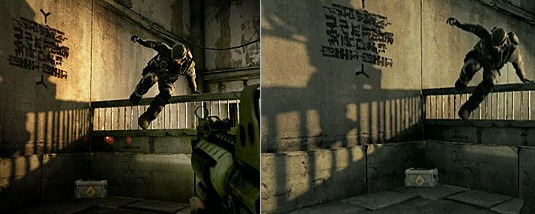 Here’s a fun little rumor: Microsoft is said to be mulling an acquisition of 3DV Systems, an Israeli company that makes “virtual reality” imaging technology for digital cameras. The implication is that advanced motion controls are coming to the Xbox 360, or perhaps Microsoft’s next console.
Here’s a fun little rumor: Microsoft is said to be mulling an acquisition of 3DV Systems, an Israeli company that makes “virtual reality” imaging technology for digital cameras. The implication is that advanced motion controls are coming to the Xbox 360, or perhaps Microsoft’s next console.
The report comes from Haartez, a respectable Israeli newspaper, but lacks sources or quotes. Microsoft is reportedly offering $35 million to acquire 3DV — not a fantastic deal considering the company has already raised $38.6 million. Some investors would lose out if the report comes to fruition.
3DV made news at the end of 2007 when it unveiled the ZCam. Unlike the Playstation’s EyeToy and the Xbox Live Vision camera, which only read location in two dimensions, the ZCam detects depth as well. VentureBeat’s Dean Takahashi, who also wrote about the Haaretz report, said from first-hand experience that the ZCam is “much more” accurate than the Wii’s motion controllers.
It’s obvious why Microsoft might be interested in the technology; now that everyone’s seen how much money the Wii is making, console makers are questioning the old video game model of thumbplay. A device that allows players to punch toward the screen with their fists or flap their arms to make avatars fly sounds fun, and therefore lucrative. It’s not a carbon copy of the Wii, but it’s a similar enough to make for healthy competition with Nintendo.
I don’t doubt that Microsoft is considering various motion control technologies for video games. Entertainment division president Robbie Bach hinted along those lines when he said it’ll take more than something “faster and prettier” to lure consumers the next time around. But rumors come and go about current generation motion controllers, and speculation on the Xbox 720 (or, for that matter, whether it’ll be called that) isn’t a rarity either. It’s a little early to say how the ZCam will play into Microsoft’s future gaming plans, if at all.

 Are the Xbox 360-killing problems that cause the infamous Red Ring of Death gone? And will people who send in their consoles for repairs have to cycle through the process multiple times to get a real fix?
Are the Xbox 360-killing problems that cause the infamous Red Ring of Death gone? And will people who send in their consoles for repairs have to cycle through the process multiple times to get a real fix? The massive multiplayer music game
The massive multiplayer music game  This is no surprise, seeing as the company was looking at $150 million in debt last December
This is no surprise, seeing as the company was looking at $150 million in debt last December  When Microsoft boasted of
When Microsoft boasted of 
 My, how Spore is multiplying.
My, how Spore is multiplying. Reports this morning have it that Microsoft’s venerable Flight Simulator game may be realistically simulating the fate of Pan Am, Eastern, and TWA: Supposedly the
Reports this morning have it that Microsoft’s venerable Flight Simulator game may be realistically simulating the fate of Pan Am, Eastern, and TWA: Supposedly the  After a hard day’s work, and a bit of watching the Inauguration Day festivities, I popped on my Xbox to find some of the presidential pomp and circumstance billed prominently for free viewing over Xbox Live.
After a hard day’s work, and a bit of watching the Inauguration Day festivities, I popped on my Xbox to find some of the presidential pomp and circumstance billed prominently for free viewing over Xbox Live.